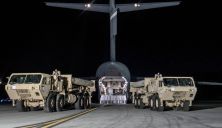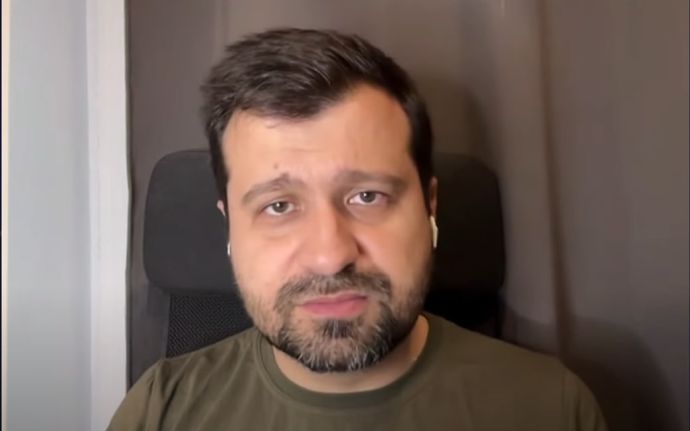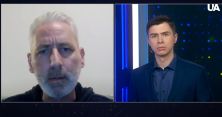In the interview we ask the German expert Serhii Sumlenny about why and who sabotages the aid to Ukraine, and does not believe in Ukrainian resistance even.
The talk between Henry Keen and Serhii unfolds into a true discussion about why there are many “fans of greater Russia” all over Europe and why Ukraine cannot be invited into NATO at this moment. Watch more in the video.
— Olaf Scholz is really, genuinely afraid of escalation, or is there maybe a hidden political reason for his timidity, let’s put it that way?
— Well, I would pay a lot of money to understand what’s going on in Olaf Scholz’s mind, but what we can see there is nothing good going on there. We see a deep crisis within the Social Democratic Party, which Scholz leads. We’ve seen that people who supported Gerhard Schröder—maybe the worst German Chancellor before Scholz and since 1949—but who endorsed him as a great Social Democrat, are now in top positions within the Social Democratic Party.
The new General Secretary of the Social Democrats awarded Schröder for “spotless service” for social democracy and publicly defended him as a person who “just had his opinion” on Russia and Ukraine, which he saw as legitimate.
Now, we see that, when asked if North Korean troops’ participation in the Russia-Ukraine war would change Germany’s policy towards weapons delivery, the government Press Secretary said, “Not at all.” Recently, this has led to an exodus of prominent, well-known Social Democrats from the party. People with decades-long memberships, 50 years even, are publicly renouncing their membership, saying they can no longer be part of this party.
Additionally, in the Brandenburg region—the region surrounding Berlin—the Social Democrats announced a possible alliance with Die Linke, one of the two most pro-Russian parties in Germany. As part of the alliance, Die Linke demanded an agreement to immediately stop military aid for Ukraine and start negotiations with Moscow.
So, yes, the Social Democrats are in deep collapse. The party has openly betrayed Ukraine, and Chancellor Scholz not only witnesses this but is somehow part of this shameless development.
— You say “shameless development,” and I clearly understand what you mean. So, what’s next? Let’s take the worst scenario. What’s next? Negotiations with Moscow? Die Linke negotiating with Moscow on what exactly—on how to split up Ukraine or what?
— I would say that from Die Linke’s perspective, and the perspective of others who dream about this scenario, it would indeed be something like discussing with Moscow how to let Russia swallow part of Ukraine. Many in Die Linke who sympathize with Vladimir Putin do so because they see Putin doing what they’re not allowed to do. They would probably gladly split Ukraine between two empires, like the Nazis and Communists once did, but since they can’t do it themselves, they take a twisted pleasure in watching Russia do what they dream about.
But after all, it’s not their motives that matter. Their actions are endangering not only Ukraine but the entire continent—Germany and Europe as a whole. They seem to believe Ukraine has lost the war, that continued fighting makes no sense, and that Russia will eventually stop without advancing further. But all of these assumptions are wrong. Ukraine is successfully fighting back, albeit with severe difficulties. Russia is certainly defeatable with enough weapons, but Germany still has not sent long-range missiles and has only sent a limited amount of equipment—what, maybe 20 or 30 Leopard 2 tanks?
The same applies to the United States. The US hasn’t sent a single F-16 jet to Ukraine and has provided only one or two Patriot batteries. President Zelensky recently mentioned that the US has only delivered 10% of the promised aid approved by Congress, leaving 90% undelivered. In this situation, more weapons would make a significant impact. As for the idea that Russia would stop at the Dnipro River or any such boundary, who told you that? Vladimir Putin himself has said that Russia’s borders never end. Every time Russia claims it won’t go further, it does. They promised never to annex Crimea, then Donbas, and then never to attack Ukraine.
Now people say Russia won’t attack Poland, the Baltic countries, or Germany. Why should we believe that? Putin has made it clear that if he says he will never attack a country, that country will probably be next.
— Well, I don’t think they truly believe that either. They’re just indifferent. If the Russian army were to stop somewhere near Berlin, they might care—maybe, or maybe not.
Guest: If the Russian army were to stop near Berlin, some of these people would likely come to welcome them with flags. Ironically, they would be in for a rude awakening if they were arrested, interrogated, tortured, or even executed, as Russia does to some foreign volunteers in Donbas. For instance, they executed an American who went to Donbas to fight for Russia; after several months, he was arrested, tortured as an American spy, and executed. Unfortunately, this realization would come too late for them, with all the harm already done.
Interviewer: But tell me, do you think NATO will eventually invite Ukraine? Is this something you believe will happen?
— I don’t believe an invitation to NATO will happen soon. I would love to see it and would be the first to open a bottle of champagne, but I don’t believe it’s likely. There are too many countries in NATO either against or skeptical of Ukraine joining. Just consider Hungary or Slovakia, which are openly anti-Ukrainian, or Germany, which is highly skeptical, or even countries like Turkey that might want something in return for their support. Reaching consensus is challenging.
What might be more feasible are bilateral agreements between Ukraine and nations that understand the urgency of the situation.
The problem is that Russia will likely exploit these decisions, claiming, for instance, that if Latvia sends troops to Ukraine, Russia’s retaliation wouldn’t fall under NATO’s Article 5 because it stems from Latvia’s actions in Ukraine. That’s nonsense, of course; no such clause exists in the treaty, but Russia will push this narrative. Unfortunately, some Western diplomats may be willing to repeat this convenient lie since, as we know, Article 5 doesn’t guarantee automatic support but rather leaves it to the discretion of each member state.
— I was about to ask about long-range weapons and restrictions. With North Korean troops reportedly fighting for Russia, could this help lift those restrictions?
— Unfortunately, even with North Korean involvement, it remains unlikely that the restrictions will be lifted. Washington’s statements have only addressed new sanctions, not the old ones, meaning we’re seeing the same pattern again.
Red lines are drawn by the West, but as they’re crossed, nothing is done. The same happened with Biden’s warning of “severe consequences” if Russia used chemical weapons in Ukraine, yet we have over 400 documented cases of Russia using chemical agents like chlorine in Ukraine, with no response.
This echoes Obama’s red line in Syria—it’s not about one administration being bad or good, but rather a Western reluctance to get involved in war. But it’s Russia, the adversary, that ultimately decides if we’re involved—not our actions or inactions.
Read also: South Korea Will Help Ukraine After DPRK Involvement: Kurt Volker










